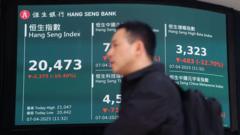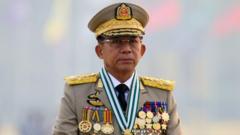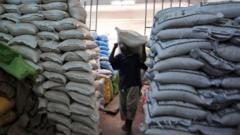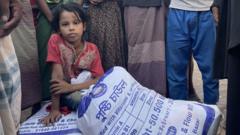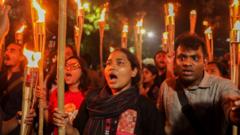In a significant political maneuver, the interim government of Bangladesh has declared a ban on the activities of the Awami League, the party of ousted leader Sheikh Hasina, as legal proceedings looms over its members and leadership.
Bangladesh Declares Ban on Awami League Amid Rising Political Tensions

Bangladesh Declares Ban on Awami League Amid Rising Political Tensions
Interim government takes decisive action against the former ruling party linked to ousted leader Sheikh Hasina.
The interim government of Bangladesh, led by Nobel laureate Muhammad Yunus, officially declared on Saturday its decision to ban all activities of the Awami League, the political faction previously chaired by former leader Sheikh Hasina. This ban, rooted in the country’s anti-terrorism regulations, is to remain in force until ongoing legal actions against the party and its leadership conclude.
The upheaval began last summer when a massive student-led protest ousted Hasina's authoritarian government, prompting her to flee to India. Despite her departure, the Awami League's influence persisted within Bangladesh, igniting tensions as accusations against its members grew. Last week’s attack on Hasnat Abdullah, a prominent student leader during the protests, was attributed to Awami League supporters, intensifying public anger and calls for the party's dissolution.
“The Awami League must be banned,” Hasnat articulated during a rally, urging fellow citizens to remain vigilant until such a ban is enforced. Hundreds joined the protest, including injured students from last year’s demonstrations, indicating the continuing frustration against Hasina’s regime. Participants also included members from other political factions such as Jamaat-e-Islami and Hefazat-e-Islam, signifying a united front against the Awami League.
In response to the escalating crisis, law minister Asif Nazrul confirmed that the government intends to terminate "all activities" of the Awami League under the Anti-Terrorism Act until legal proceedings conclude at the International Crimes Tribunal. Despite its nomenclature, this tribunal is a domestic court, expected to adjudicate allegations regarding atrocities committed by the Awami League during the tumultuous protests of 2024.
An inquiry commission set up by the interim government disclosed in December alarming findings that suggested widespread human rights abuses during Hasina's tenure, with reports of mass disappearances. Additionally, a United Nations committee found evidence that law enforcement and Awami League affiliates were responsible for over 1,400 deaths during the protests.
Responding to the ban, the Awami League criticized the interim government, labeling it as illegitimate and asserting that its decisions lack authenticity. Tensions within the country simmer as public dissatisfaction with the past regime weighs heavily on the political landscape.
As events continue to unfold, the future political landscape of Bangladesh remains uncertain amid this ongoing struggle for power and justice for the victims of past grievances.
The upheaval began last summer when a massive student-led protest ousted Hasina's authoritarian government, prompting her to flee to India. Despite her departure, the Awami League's influence persisted within Bangladesh, igniting tensions as accusations against its members grew. Last week’s attack on Hasnat Abdullah, a prominent student leader during the protests, was attributed to Awami League supporters, intensifying public anger and calls for the party's dissolution.
“The Awami League must be banned,” Hasnat articulated during a rally, urging fellow citizens to remain vigilant until such a ban is enforced. Hundreds joined the protest, including injured students from last year’s demonstrations, indicating the continuing frustration against Hasina’s regime. Participants also included members from other political factions such as Jamaat-e-Islami and Hefazat-e-Islam, signifying a united front against the Awami League.
In response to the escalating crisis, law minister Asif Nazrul confirmed that the government intends to terminate "all activities" of the Awami League under the Anti-Terrorism Act until legal proceedings conclude at the International Crimes Tribunal. Despite its nomenclature, this tribunal is a domestic court, expected to adjudicate allegations regarding atrocities committed by the Awami League during the tumultuous protests of 2024.
An inquiry commission set up by the interim government disclosed in December alarming findings that suggested widespread human rights abuses during Hasina's tenure, with reports of mass disappearances. Additionally, a United Nations committee found evidence that law enforcement and Awami League affiliates were responsible for over 1,400 deaths during the protests.
Responding to the ban, the Awami League criticized the interim government, labeling it as illegitimate and asserting that its decisions lack authenticity. Tensions within the country simmer as public dissatisfaction with the past regime weighs heavily on the political landscape.
As events continue to unfold, the future political landscape of Bangladesh remains uncertain amid this ongoing struggle for power and justice for the victims of past grievances.








